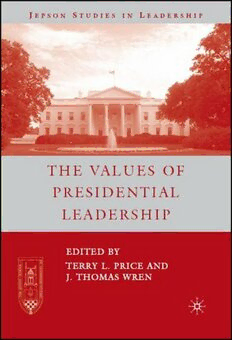
The Values of Presidential Leadership (Jepson Studies in Leadership) PDF
251 Pages·2007·0.98 MB·English
Most books are stored in the elastic cloud where traffic is expensive. For this reason, we have a limit on daily download.
Preview The Values of Presidential Leadership (Jepson Studies in Leadership)
Description:
In this volume, presidential scholars from communication, history, law, philosophy, political science, and psychology explore the broader phenomenon of leadership. Like leadership more generally, presidential leadership is a value-laden activity, an exercise in communication, and a collective enterprise. It is also subject to psychological and historical barriers to interpretation. Finally, presidential leadership is instrumental: presidents must achieve their valued ends. Contributors address each of these aspects of leadership in essays on how presidential values are determined or constructed, how they are condoned and criticized, how they are packaged and conveyed, and how they are interpreted and acted upon.
See more
The list of books you might like
Most books are stored in the elastic cloud where traffic is expensive. For this reason, we have a limit on daily download.
